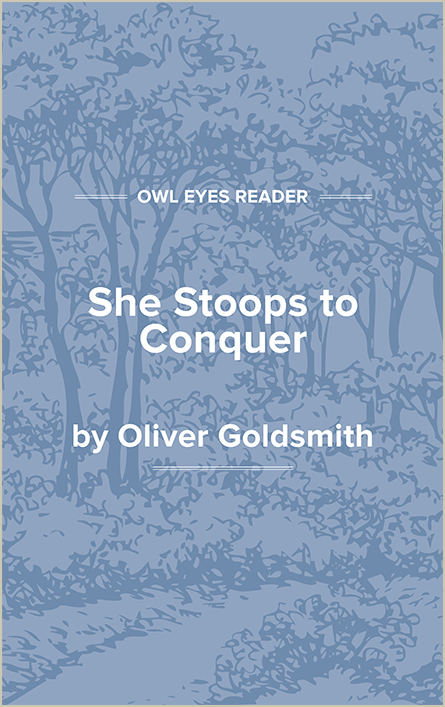Analysis Pages
Oliver Goldsmith Biography
Oliver Goldsmith, the son of a Protestant clergyman in Ballymahon, was born in a small and poor village in Ireland. When Goldsmith was two years old his father succeeded to a more lucrative parish and moved his family to Lissoy, Westmeath. Little in Goldsmith’s early life pointed him toward literature. He received his earliest education at home from a maid-servant and thereupon at the Lissoy village school and a variety of boarding schools. Because he was small in stature, pitted with smallpox, and awkward in manner, he was the butt of his schoolmates’ jokes, and his schoolmasters considered him “a stupid, heavy blockhead.” However, both his characteristic good nature and his characteristic indolence remained unaltered.
About the time he planned to attend university, his sister married a well-to-do young man. When his father felt obliged to send her forth with a suitable dowry, the family’s financial situation became such that young Oliver was forced to attend the university as a sizar (a student paying his way through menial domestic chores) instead of as a pensioner (a student paying tuition). Despite this blow to his pride, he let himself be won over to the idea; he passed the college entrance examination—last on the list—and entered Trinity College in 1745.
His academic standing and economic status at Trinity College are largely matters of conjecture, but it is known that he was baited and occasionally beaten by his tutor and that he was perpetually without funds. His father died about this time, whereupon Goldsmith became dependent on his uncle, Mr. Contarine, to whom he applied for money that he went on to lose at the gaming tables or spent in roisterous frolics. One such frolic in Goldsmith’s rooms was interrupted by a surprise visit from his tutor, who, in righteous indignation at such unrestraint, struck the boy before his friends. Goldsmith’s sanguinity was for once overcome, and he retaliated by packing his bags and leaving school. He was persuaded to return, and he graduated in 1749, last on the list.
Goldsmith devoted the next years to idleness and a Grand Tour through Europe, ostensibly in search of a medical degree. In his petitions to his uncle for money, he cited the names of a number of scholars from whom he was supposedly learning, but none of those men have been found to have existed. Nevertheless, Goldsmith obtained his medical degree somehow, but it was not founded on enough knowledge for him to practice in England.
Goldsmith arrived in London about 1756, penniless, without work, and without ideas for any. Intermittently he did stints of proofreading for Samuel Richardson’s press and of ushering for a school. Finally, almost as a last resort, he began to do hack-writing, living the while in first one and then another of London’s slum garrets. His first jobs in 1757 were writing book reviews for the bookseller Griffiths, a hard taskmaster, with whom Goldsmith quarreled often. Soon their association was all but broken off. From then on Goldsmith inveighed against all critics, of whose number he had been an unwilling member. His first public attack on professional criticism appeared in An Enquiry into the Present State of Polite Learning in Europe, in which little volume he kicked enough notable critical shins to attract attention. It is for this notoriety chiefly that the book is noteworthy, though the graceful, supple, antithetical style so characteristic of the mature Goldsmith was already beginning to be apparent in his writing.
The reputation—or notoriety—that this book aroused also secured for him the editorship of The Bee, a weekly periodical that failed soon after but not before Goldsmith was sought out by Tobias Smollett, who asked that he write for the British Magazine , and by Samuel Johnson, who made him a protégé. Johnson’s recognition of him marked the turn in his literary career but not that in his financial circumstances. Goldsmith made considerable money in his later...
(The entire page is 1,395 words.)
Owl Eyes subscribers get unlimited access to our expert annotations, analyses, and study guides on your favorite texts. Master the classics for less than $5/month!

